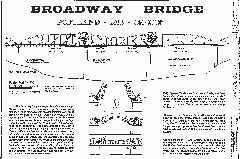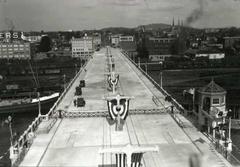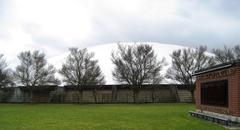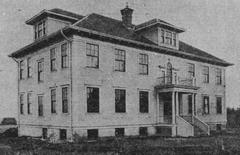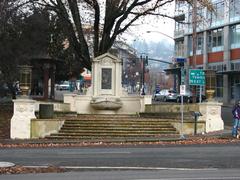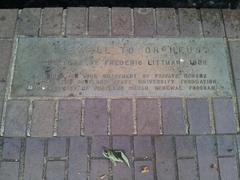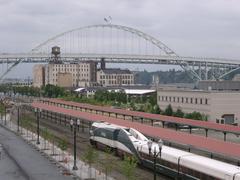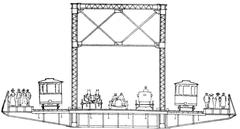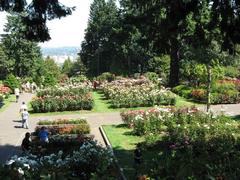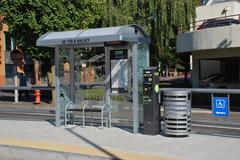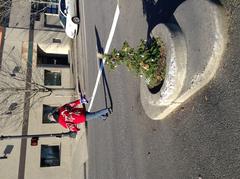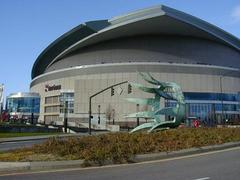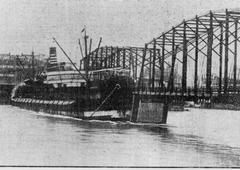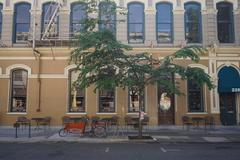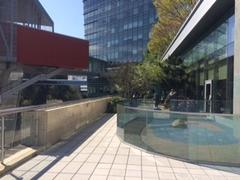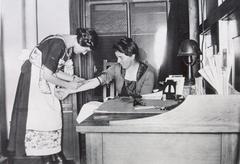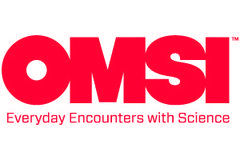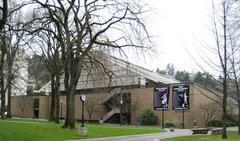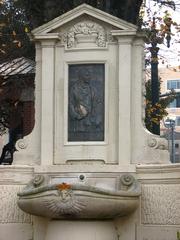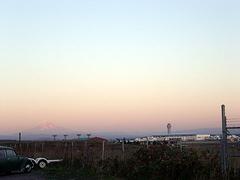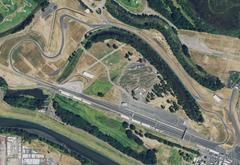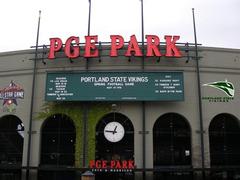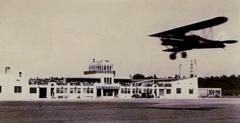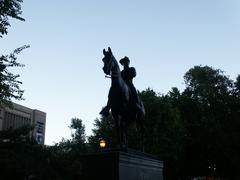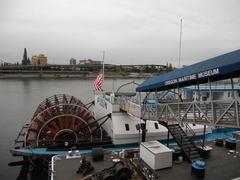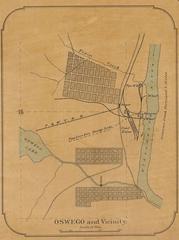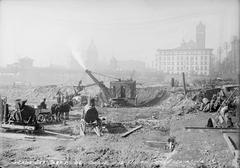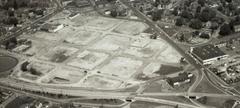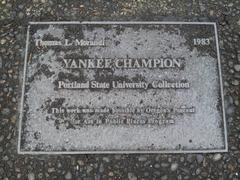Oregon Holocaust Memorial Visiting Hours, Tickets, and Portland Historical Sites Guide
Date: 04/07/2025
Introduction: Honoring Memory, Inspiring Reflection
The Oregon Holocaust Memorial, set within Portland’s tranquil Washington Park, stands as a solemn tribute to the victims and survivors of the Holocaust. Conceived through the collective determination of local survivors, families, and civic leaders, this memorial is more than a site of remembrance—it is an educational resource designed to foster empathy, awareness, and a commitment to “Never Again.” Thoughtful artistic elements, including bronze castings of personal items, a cobblestone circle evoking a European square, and a vault containing ashes from six major extermination camps, create a powerful narrative that connects history’s darkest chapter to the lives of Oregonians and visitors alike. With free daily access, full accessibility, and proximity to other cultural landmarks, the memorial welcomes all who wish to reflect and learn.
This comprehensive guide details the Oregon Holocaust Memorial’s history, design, visitor information, and how it fits into Portland’s vibrant heritage landscape. Whether you are a history enthusiast, educator, student, or traveler, you will find everything you need to plan a meaningful visit.
(Oregon Jewish Museum and Center for Holocaust Education, Portland.gov, LetsRoam)
Table of Contents
- Historical Background and Origins
- Design and Symbolism
- Dedication, Stewardship, and Educational Mission
- Inclusivity and Community Impact
- Visitor Information
- Practical Tips for Your Visit
- Frequently Asked Questions (FAQ)
- Conclusion and Call to Action
- References
Historical Background and Origins
Community Vision and Early Efforts
The Oregon Holocaust Memorial was born out of the vision of Holocaust survivors and their descendants who settled in Oregon after World War II. In 1994, these individuals formed the Oregon Holocaust Survivors Refugees and Families Committee (OHSRAF) to advocate for a permanent public memorial that would honor those lost, educate future generations, and provide a space for reflection. Their efforts paralleled a national movement among American cities to create Holocaust memorials as public educational tools, particularly as the survivor generation aged. (Oregon Jewish Museum and Center for Holocaust Education, PDXScholar)
Site Selection and Civic Support
In 1995, the Portland City Council unanimously approved a site in Washington Park—a space chosen for its accessibility, beauty, and symbolism as a community gathering place. The Oregon Holocaust Memorial Coalition (OHMC), including survivors, civic leaders, and organizations, was established to oversee the memorial’s development and ensure it represented the experiences of all groups persecuted during the Holocaust. (Portland.gov, Walsh Construction)
Design and Symbolism
The memorial’s design, developed by artists Tad Savinar and Paul Sutinen, landscape architects Marlene Salon, John Warner, and Marianne Zarkin, typographer John Laursen, and historian Marshall Lee, is rich with symbolism:
- Cobblestone Circle: Evokes a European town square where Jewish families were gathered before deportation. A stone bench and wrought-iron gate offer a contemplative space.
- Bronze Artifacts: Scattered shoes, glasses, suitcases, and other personal belongings symbolize lives interrupted and the abruptness of displacement.
- Railroad Tracks: Granite bars embedded in the cobblestone path represent the trains that transported millions to ghettos and camps.
- History Wall: Stone panels with succinct Holocaust history and survivor quotes provide context and personal connection.
- Soil Vault Panel: Contains soil and ashes brought from Auschwitz-Birkenau, Bełżec, Chelmno, Majdanek, Treblinka, and Sobibor, forging a direct link to the sites of genocide.
- Central Pillar: Stands above the soil vault, marking the journey’s end and symbolizing resilience and hope.
(Wikipedia, LetsRoam, Portland.gov)
Dedication, Stewardship, and Educational Mission
The Oregon Holocaust Memorial was officially dedicated on August 29, 2004, after a decade of advocacy and planning. Its stewardship transitioned from the Oregon Holocaust Resource Center to the Oregon Jewish Museum and Center for Holocaust Education (OJMCHE), which maintains the site and leads educational programming.
Education is central to the memorial’s mission. Through survivor testimonies, historical panels, and guided tours, the site fosters empathy, combats indifference, and encourages active remembrance. Annual events like Yom HaShoah (Holocaust Remembrance Day) and school visits ensure the memorial remains a living classroom for all ages.
(Oregon Jewish Museum and Center for Holocaust Education, Travel Portland)
Inclusivity and Community Impact
While centered on Jewish experiences, the memorial also acknowledges Roma, people with disabilities, LGBTQ+ individuals, and political dissidents persecuted during the Holocaust, reflecting its broader historical scope. Community support for the project, despite some land-use concerns, demonstrated Portland’s commitment to public remembrance and inclusivity.
(PDXScholar)
The memorial’s integration into Washington Park alongside other cultural sites strengthens its role as a cornerstone of Portland’s civic and educational life.
Visitor Information
Location
- Address: Intersection of SW Washington Way and Wright Avenue, Washington Park, Portland, Oregon
(komoot.com)
Visiting Hours & Admission
- Hours: Open daily from dawn to dusk (Washington Park hours are generally 6:00 AM to 10:00 PM).
- Admission: Free; no tickets or reservations required.
Accessibility
- Fully wheelchair and stroller accessible via paved paths. Benches are available, and the site is designed for visitors with mobility challenges.
Getting There & Parking
- Public Transit: Served by TriMet bus lines and MAX Light Rail (Washington Park station is nearby).
- Parking: Metered parking is available in Washington Park; it can fill up during peak times, so public transit is recommended for convenience. (ohm.edmethods.com, komoot.com)
Guided Tours & Special Events
- Guided tours and educational programs are available through OJMCHE and should be booked in advance.
- Annual commemorations and lectures are held, especially around Yom HaShoah. (OJMCHE)
Nearby Portland Historical Sites
Combine your visit with:
- Portland Japanese Garden
- International Rose Test Garden
- Oregon Zoo
- Pittock Mansion
- Portland Art Museum
Practical Tips for Your Visit
- Best Time: Spring and summer for garden blooms; early morning or late afternoon for quiet reflection.
- Duration: 30–60 minutes is recommended to fully absorb the memorial.
- Etiquette: Maintain respectful silence; supervise children; photography is allowed but should be discreet.
- Remembrance: Flowers or small stones may be left as tokens.
- Restrooms: Available in Washington Park (seasonal availability; check park maps).
- Pets: Dogs on leash are allowed in Washington Park, but not inside the memorial area unless they are service animals. (usa-artmuseum.worldorgs.com)
Frequently Asked Questions (FAQ)
What are the visiting hours?
The memorial is open daily from dawn to dusk (typically 6:00 AM – 10:00 PM).
Is there an admission fee or ticket required?
No, admission is free and no tickets are required.
Is the memorial accessible?
Yes, it is fully accessible by wheelchair and stroller.
Are guided tours available?
Yes, through the Oregon Jewish Museum and Center for Holocaust Education by appointment.
Where can I park?
Metered parking is available in Washington Park; public transit is recommended during busy periods.
Can I combine a visit to the memorial with the museum?
Yes, the OJMCHE is a short drive or transit ride away and is recommended for a deeper educational experience.
Are pets allowed?
Only service animals are allowed in the memorial area.
Conclusion and Call to Action
The Oregon Holocaust Memorial stands as one of Portland’s most moving and meaningful historical sites. Through its symbolic design, educational mission, and integration within Washington Park, it invites visitors to reflect on the Holocaust’s enduring lessons about tolerance, resilience, and the value of human dignity. By visiting, participating in programs, or supporting the Oregon Jewish Museum and Center for Holocaust Education, you help preserve history and promote a more compassionate society.
For enhanced experiences, downloadable guides, and updates on events, download the Audiala app, follow OJMCHE on social media, and explore related Portland historical sites. Make the Oregon Holocaust Memorial a focal point of your cultural journey in Portland.
References
- Oregon Jewish Museum and Center for Holocaust Education
- Portland.gov
- LetsRoam
- Wikipedia
- PDXScholar
- Walsh Construction
- komoot.com
- ohm.edmethods.com
- usa-artmuseum.worldorgs.com
- worldjewishtravel.org
